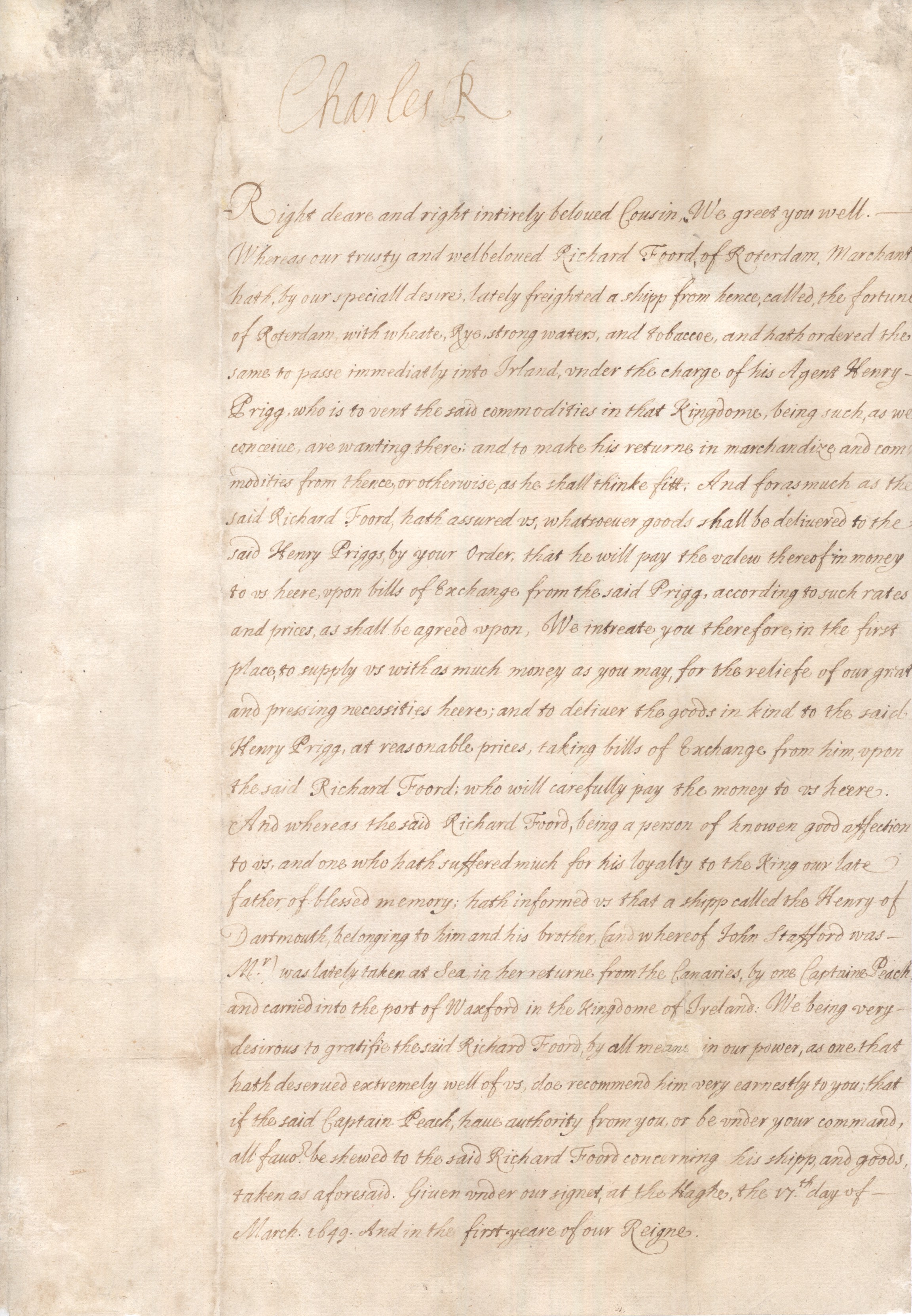
CHARLES ASKING HIS COUSIN PRINCE RUPERT FOR MONEY FOR THE "RELIEF OF OUR GREAT AND PRESSING NECESSITIES" IN 1649
CHARLES II
(1630-1685, King of Great Britain)
Important early Document signed at the head as King to his cousin Prince Rupert
to "Right deare and right intirely beloved Cousin, We greet you well. Whereas our trusty and wellbeloved Richard Foord of Roterdam, Marchant, hath, by our speciall desires, lately freighted a shipp from hence, called the fortune of Roterdam with wheate, Rye, strong waters, and tobaccoe, and hath ordered the same to passe immediately into Irland under the charge of his Agent Henry Prigg who is to vend the said commodities in that Kingdome, being such as we conceive are wanting there and to make his return in merchandize and commodities from thence, or otherwise as he shall think fitt; And for as much as the said Richard Foord, hath assured us, whatsoever goods shall be delivered to the said Henry Priggs by your Order, that he will pay the valew thereof in money to us heere upon bills of Exchange from the said Prigg, according to such rates and prices as shall be agreed upon We intreate you therefore in the first place, to supply us with as much money as you may, for the relief of our great and pressing necessities heere and to deliver the goods ... the said Richard Foord being a person of knowen good affection to us, and one who hath suffered much for his loyalty to the King our late father of blessed memory, hath informed us that a shipp called the Henry of Dartmouth belonging to him and his brother (and whereof John Stafford was Mr) was lately taken at Sea in her returne from the Canaries by one Captaine Peach and carried into the port of Waxford in the Kingdom of Ireland. We being very desirous to gratify the said Richard Foord by all means in our power, as one that hath deserved etremely well of us, doe recommend him very earnestly to you that if the said Captain Peach have authority from you or be under your command all favor be shewed to the said Richard Foord concerning his shipp and goods taken as aforesaid Given under our signet at the Haghe, the 17th day of March 1649 in the first yeare of our Reigne ...", 1 side folio., Haghe, 17th March
signature slightly faded, margin repaired without loss of text. Together with an early transcription which identifies the recipient as the address leaf is no longer present.
In 1648 Charles moved to The Hague, where his sister Mary and his brother-in-law William II, Prince of Orange, seemed more likely to provide substantial aid to the royalist cause than his mother's French relations.
Charles II's father, Charles I, was executed at Whitehall on 30 January 1649, at the climax of the English Civil War. Although the Parliament of Scotland proclaimed Charles II king on 5 February 1649, England entered the period known as the English Interregnum or the English Commonwealth, and the country was a de facto republic, led by Oliver Cromwell. Cromwell defeated Charles II at the Battle of Worcester on 3 September 1651, and Charles fled to mainland Europe. Cromwell became virtual dictator of England, Scotland and Ireland, and Charles spent the next nine years in exile in France, the Dutch Republic and the Spanish Netherlands. A political crisis that followed the death of Cromwell in 1658 resulted in the restoration of the monarchy, and Charles was invited to return to Britain. On 29 May 1660, his 30th birthday, he was received in London to public acclaim. After 1660, all legal documents were dated as if he had succeeded his father as king in 1649.
Charles was one of the most popular and beloved kings of England, known as the Merry Monarch, in reference to both the liveliness and hedonism of his court and the general relief at the return to normality after over a decade of rule by Cromwell and the Puritans. Charles's wife, Catherine of Braganza, bore no live children, but Charles acknowledged at least twelve illegitimate.
Prince Rupert of the Rhine (1619-1682) was a noted German soldier, admiral, scientist, sportsman, colonial governor and amateur artist during the 17th century. He was a younger son of the German prince Frederick V, Elector Palatine and his wife Elizabeth, the eldest daughter of James I of England. Thus Rupert was the nephew of King Charles I of England and the first cousin of King Charles II.
Item Date:
1649
Stock No:
39361

<< Back